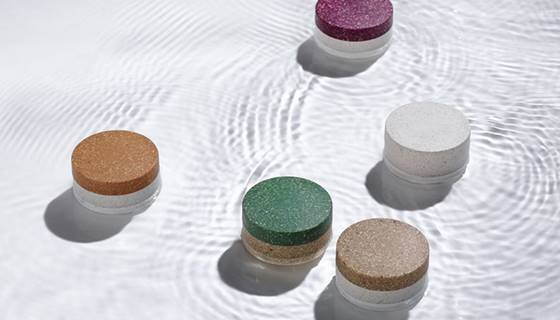Circular economy successful start-ups from around Europe
To help you understand how a circular start-up introduces innovative ideas in the market, based on the CE model, we have gathered a number of cases. It is suggested that you read them all very carefully. After reading these examples, it is useful to check how you can transform your existing business model into a circular one, or examine how you can create your brand-new business model on CE. Another useful exercise would be to self-measure the level of innovation that is brewed when you start using the CE model for your start-up.
Mimica (https://www.mimicalab.com/)
With smart design labels that extend the shelf life of fresh food, Mimica is a start-up which aims to make the food system more sustainable. One of the major problems faced by sustainable food systems is that every aspect of the food supply chain carries waste. The labels of Mimica are an intervention at the retail and market level to stop tossing out nutritious foods!
“In the worst-case situation, expiration dates are set, but the fact is that we keep our food much better than that. In the unlikely case of issues in the supply chain or in our homes, dates are shortened to protect customers,” said Mimica founder and director Solveiga Pakštaitė. “And this ultimately hurts the bottom lines of retailers, because this hurts their ability to sell output in their shops. Only add back two days, and in our supermarkets, we can see food waste being cut in half, more than that in our homes, and when shelf life is extended, sales go up. The shelf life doubles, for items such as juice and beef.”
The label, Mimica Touch, tells customers precisely when food is spoiled. They just run their fingers over it and the food is new if the mark is smooth. It’s spoiled if it has bumps.
The start-up is a highly relevant example of CE model adoption.

Source: https://www.mimicalab.com/
Resortecs (https://resortecs.com/)
Resortecs is a start-up based in Belgium which offers a solution to the lack of recycling of apparel. Only about 1% of garments are recycled, and one big explanation is that garments are not meant to be recycled, since they have multiple components that need to be separated, such as zippers or buttons.
Resortecs has produced a new material that can be used to stitch these components together that breaks down at a high heat, allowing the components to easily detach and eliminating a major barrier to the reuse of these components. Plus, this heat-sensitive material only breaks down at very high temperatures, so when people wear clothing, it does not affect the fabric itself.[1]
“Garments made can be washed and ironed,” said Resortecs CEO Cédric Vanhoeck. “The material is not damaged in the process.”

Source: https://resortecs.com/
Bundles – (https://bundles.nl/en/quality-sustainability/)
Bundles is a start-up that offers its service on a pay-per-wash basis, instead of selling washing machines. The company maintains control of its appliances and tracks their use with a system that offers electricity, water and detergent usage statistics for customers. Tips on how to maximize the use of machines are also provided, which can help reduce economic and environmental costs while extending the life of the system as well. Once a machine is returned to Bundles, it will be repaired and then rented to the next client.

Source: https://bundles.nl/en/quality-sustainability/
Rotterzwam (https://www.rotterzwam.nl/)
Rotterzwam is a circular start-up that produces coffee waste to grow oyster mushrooms. Although its policy of circularity is basically recycling, it incorporates many revenue sources, separating itself from more traditional businesses.
The Rotterzwam’s founder and CEO explains: “The business model is complex, since we have multiple cashflows, which also differentiates us from ‘old economy’ companies, as we do not have a core business model.” As a first stage, the business sells edible mushrooms cultivated from coffee grounds to local restaurants. As a second stage, it picks up coffee waste from companies that manufacture coffee. Then, it trains entrepreneurs in other cities to build and operate the same business model of growing mushrooms from coffee waste through e-learning and online courses.
A number of related companies have ‘mushroomed’ in the Netherlands thanks to this replication strategy: Fungi Factory in Utrecht, Westerzwam in Giethoorn and ZuiderZwam in Tilburg, among others. Finally, the start-up carries out projects and holds speeches at events and conferences as a fourth revenue source, for which it gets paid.

Source: https://www.rotterzwam.nl/
Aeropowder – (https://www.aeropowder.com/)
Aeropowder is an award-winning London start-up that produces fresh products from surplus feathers. Their goal is to produce useful waste materials that occur in society. We eat more than 134 million chicken per day, and more than 10,000 tons of feathers per day are produced by the poultry industry, regarded as waste.
So, for feathers to be integrated into a circular economy, there is a major demand. Keratin, a chemically resistant and physically powerful protein, is made of feathers. They are one of the lightest natural fibres in nature, due to their microscopic structure, and are also excellent thermal insulators. The business was launched in 2016 and, thanks to a grant from Horizon 2020, (EUs biggest funding programme) was funded €50,000 to set up its unique business model.[2]

Source: https://www.globalinnovationexchange.org/innovation/aeropowder
Sulapac – (https://www.sulapac.com/)
This start-up based in Helsinki is innovating to redefine the packaging industry through the manufacture of materials such as straws, made from renewable raw materials and side-stream wood, microplastic-free and completely biodegradable. These products uniquely created by Suvi Haimi and Laura Kyllönen, can be used as packaging for anything from cosmetics to food to gift boxes and more. It has all the advantages of plastic, but it completely biodegrades and leaves no trace until it’s gone. The business raised new investments in 2018 and is scaling up, with the total investment so far exceeding EUR 2.9 million.

Source: https://www.quadpack.com/csr/sulapac-partnership/collection/
[1] https://circulareconomy.europa.eu/platform/en/good-practices/resortecs-solves-recycling-complexity-dissolvable-threads

 Ελληνικά
Ελληνικά Polski
Polski Slovak
Slovak Español
Español Lietuvių
Lietuvių Português
Português